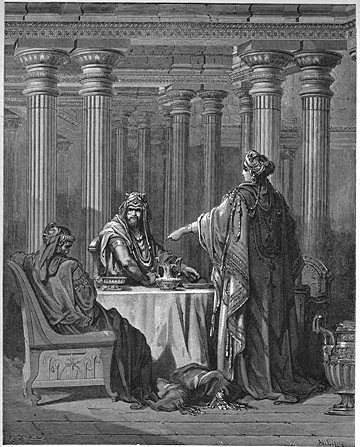Esther 7
1 Manghai neh Haman te manghainu Esther neh ok hamla cet.
So the king and Haman came in, to banquet with Esther the queen.
2 Buhkoknah a hnin bae dongkah misurtui a ok bal vaengah tah manghai loh Esther te, “Manghainu Esther nang kah huithuinah te menim? Nang ham mpaek bitni. Na kueknah te ram rhakthuem hil pataeng han suem bitni,” a ti nah.
Then said the king unto Esther, on the second day also, during the banquet of wine, What is thy petition, Queen Esther, that it may be granted thee? and what is thy request—unto the half of the kingdom—that it may be performed?
3 Esther manghainu loh a doo tih, “Manghai nang mikhmuh ah mikdaithen ni ka hmuh atah, manghai ham a then mak atah ka huithuinah bangla, ka kueknah bangla, kamah neh ka pilnam kah hinglu ham kai taengah bet n'rhen mai.
Then answered Esther the queen, and said, If I have found favour in thine eyes, O king, and if, unto the king, it seem good, let my life be granted me, as my petition, and my people, as my request;
4 Kamah khaw, ka pilnam khaw, mitmoeng sak ham neh ngawn ham khaw, milh sak ham n'yoih uh coeng. Salnu, salpa bangla n'yoih uh. Manghai kah pocinah ham rhal neh a tluk pawt dongah hil ka phah,” a ti nah.
For we are sold, I and my people, to be destroyed, to be slain and to be caused to perish. If indeed, for bondmen and for bondwomen, we had been sold, I had held my peace, although the adversary could not have made good the damage to the king.
5 Manghai Ahasuerus te cal tih Esther manghainu taengah, “Anih te unim? Anih te melae? Te bang te saii ham a lungbuei aka hah te unim?” a ti nah.
Then spake King Ahasuerus, and said unto Esther the queen, —Who is he now, and where is he, whose heart is set to act thus?
6 Te vaengah Esther loh, “Tekah hlang tah rhal neh thunkha boethae Haman ni,” a ti nah. Te dongah Haman tah manghai neh manghainu mikhmuh ah let coeng.
And Esther said, A man who is an adversary and enemy, this wicked Haman. And, Haman, was terrified, before the king and the queen.
7 Manghai khaw buhkoknah misurtui kung lamloh a kosi neh thoo tih impuei dum la cet. Tedae Haman tah boethae loh manghai taeng lamkah amah a khah te a hmuh dongah a hinglu kongah manghainu Esther te hloep ham pai pueng.
Now, the king, arising in his wrath from the banquet of wine, and going into the palace garden, Haman, stood to make request for his life from Esther the queen, for he saw that ruin, was determined against him, by the king.
8 Te phoeiah manghai te impuei dum lamloh buhkoknah im kah misurtui kung la mael. Te vaengah Haman te Esther kah a thingkong soah ana bakop pah. Te dongah manghai loh, “Im khui kah kamah taeng nawn ah manghainu te na khoh ham bal a?” a ti nah. Manghai ka lamloh ol a thoeng neh Haman maelhmai khaw a thing uh coeng.
When, the king, returned out of the palace garden into the place of the banquet of wine, Haman, was lying prostrate upon the couch whereon Esther was. Then said the king, Will he, even dare to force the queen, while I am in the house? No sooner had the word gone forth out of the mouth of the king, than, the face of Haman, they had covered.
9 Te vaengah imkhoem rhoek khui lamkah pakhat Harbona loh manghai mikhmuh ah, “Haman loh Mordekai ham thing a saii coeng ke. Te te Haman im ah dong sawmnga a sang la pai tih manghai ham tah hnothen la a thui,” a ti nah. Te dongah manghai loh, “Te dongah te amah kuiok sak,” a ti nah.
Then said Harbonah—one of the eunuchs before the king—Yea lo! the gallows that Haman made ready for Mordecai, who had spoken well for the king, is standing in Haman’s house, of a height of fifty cubits. Then said the king, Hang him thereon.
10 Mordekai ham a tawn pah thing dongah Haman te a kuiok sak uh van daengah ni manghai kah kosi khaw a daeh pueng.
So they hanged Haman on the gallows which he had prepared for Mordecai, —and, the wrath of the king, was appeased.





















